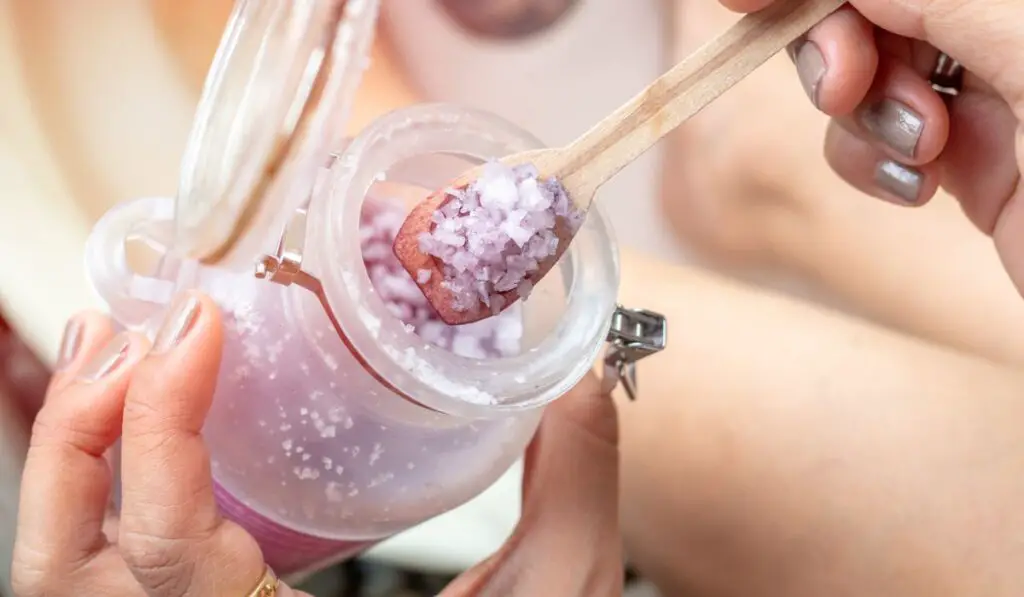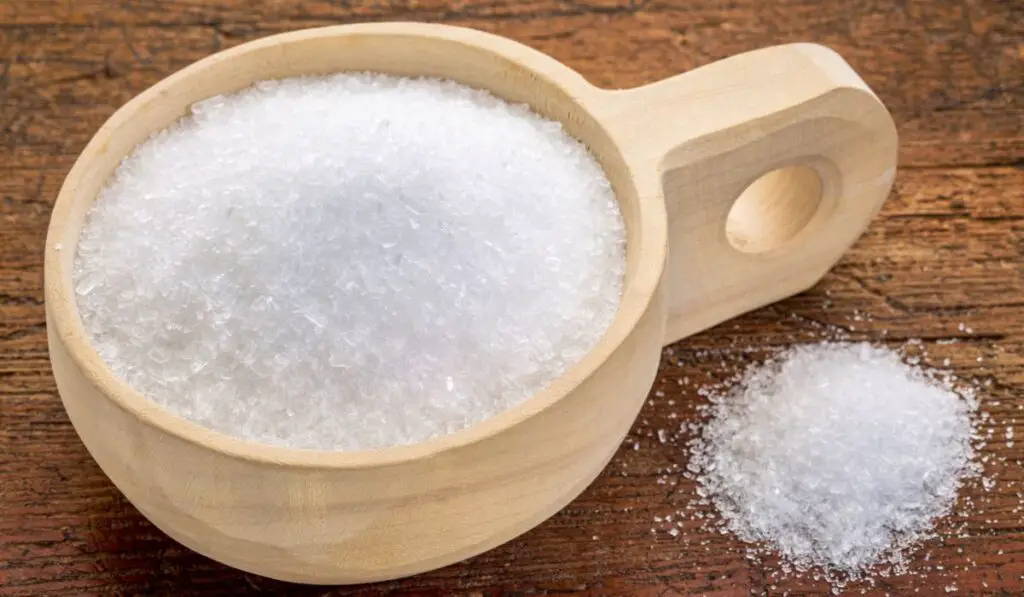Adding a few scoops of Epsom salt to your hot bath is a great way to ease sore muscles and provide relief from aches, pains, and inflammation. But is it safe to use epsom salts in an inflatable hot tub?
The magnesium sulfate in Epsom salt is powerful, and it can be too strong for the material used to construct inflatable hot tubs. The sulfur levels in the salt can quickly break down the tub’s walls and cause severe damage to the inflatable walls, liners, and plumbing components.
However, this doesn’t mean that you can’t enjoy the benefits of soothing salts in an inflatable hot tub. There are alternatives to Epsom salts that are safe and can be used without causing damage to your hot tub. Let’s take a closer look at the options.
What Is Epsom Salt Made Out Of?

Epsom salt is a popular remedy for various ailments. It’s made up of magnesium and sulfate (sulfur + oxygen), both of which are beneficial to human health.
Magnesium helps improve muscle and nerve function, reduce stress, and regulate heart rhythm.
Sulfate, on the other hand, is essential for many metabolic activities. It helps flush toxins from the body, maintain healthy joints, reduce inflammation, and improve the absorption of nutrients.
Because of these health benefits, Epsom salt is normally used for a range of therapeutic purposes such as sprains, sore feet, skin problems, and so on. Its popularity has grown over the years, and now a lot of people use it to relax in Epsom salt baths.
Can Epsom Salt Be Added to an Inflatable Hot Tub?
Unfortunately, you should never add Epsom salt to an inflatable hot tub. The benefits of Epsom salt may be appealing, but it’s important to understand why you shouldn’t use it in your inflatable hot tub.
The recommended salt level for your inflatable hot tub is under 1,500 parts per million (ppm). Epsom salt, however, contains 20,000 ppm. Yes, you read that right. It’s way higher than what your inflatable hot tub needs.
If you use Epsom salt in your hot tub, it can cause severe damage to the interior of the tub, including the inflatable walls, liners, and plumbing components. The excess salt will corrode the material of your tub and could even cause it to leak.
In addition, the extra salt can cause your pH levels to skyrocket and make it difficult for you to regulate them. And as if all that isn’t not worrying enough, when magnesium (present in Epsom salt) mixes with chlorine, it produces magnesium chloride.
Magnesium chloride is a chemical known to cause skin irritation, respiratory issues, and other health concerns. So if you don’t want to take any risks with your health and the longevity of your inflatable hot tub, avoid using Epsom salt in your spa.
What About a Regular Hot Tub?
Similar to an inflatable hot tub, Epsom salt should never be added to a regular hot tub. Despite the popularity of Epsom salt baths, adding it to a hot tub would be far too much for your skin to handle.
Not only could this cause skin irritation and dryness, but it can also damage the plumbing system of your tub. Epsom salt is a hygroscopic material, meaning it absorbs water. The salt will corrode and build up in pipes and other parts of the hot tub system.
As a result, you could end up with costly repairs. It can also contaminate your hot tub water, leaving it looking and feeling cloudy.
What to Do if You Already Put Epsom Salt in Your Hot Tub
If you’ve already put Epsom salt in your inflatable hot tub, don’t worry too much. It doesn’t necessarily mean the end of your hot tub fun.
You should take the following steps to rectify the situation:
- Drain the water from your tub and dispose of it safely.
- Clean out the filters using a special filter cleaner (on Amazon) or mild detergent if necessary.
- Refill the hot tub with fresh, clean water.
- Add an approved chemical sanitizer, such as chlorine or bromine, to the water.
- Test the pH of the water and adjust as needed.
The best way to reduce the chance of damage to your hot tub and improve its performance is to use a hot tub treatment chemical. These are specially designed to maintain the pH balance of the water, reducing bacteria growth and keeping your water clean and safe.
Regular cleaning and shocking of your hot tub are also recommended to keep it functioning properly.
What Else Should You Avoid Putting in a Hot Tub?
In addition to Epsom salt, there are some other items you should never put in an inflatable hot tub:
Bubbles and Bath Oils
While they may seem like fun additions, bubble baths and bath oils can leave behind residues that can damage the liner of an inflatable hot tub. To avoid this, use a specialty hot tub cleanser instead.
Detergents and Soaps
Regular detergent or soap in your hot tub can cause skin irritation and eye problems. Instead, opt for specialized hot tub cleaning solutions that are safe to use in the water.
Chlorine
Chlorine is typically used to sanitize traditional hot tubs, but it can be too harsh for an inflatable hot tub. To sanitize your inflatable hot tub, use a bromine-based sanitizer instead.
Floating Toys and Candles
Candles and toys can be fun additions to your hot tub, but they pose a safety risk if left unattended. To ensure the safety of your guests, avoid using these items in an inflatable hot tub.
Alternatives to Epsom Salt
It’s perfectly okay to add something to your hot tub experience, so don’t be disheartened if you can’t use Epsom salt. There are a number of alternatives that you can use to achieve a similar result.
One great option is aromatherapy salts, which are specially formulated with various essential oils to help create a relaxing atmosphere. Aromatherapy salts also contain natural minerals and can help keep your hot tub pH levels balanced, just like Epsom salts.
The InSPAration Hot Tub Spa & Bath Aromatherapy Pillow Packs (on Amazon) are an excellent example of aromatherapy salts that are perfect for your hot tub.
There are also natural hot tub treatments you can use that don’t involve adding anything to the water. For example, you can use a hot tub cover to help keep your water clean and regulate the temperature.
Say No to Epsom Salt

At the end of the day, it’s best to avoid using Epsom salts in your inflatable hot tub. Epsom salt is good for your skin and can provide many health benefits, but it also has its limitations when used in an inflatable hot tub.
If you use Epsom salts in your hot tub, you risk damaging the vinyl material and degrading the integrity of the structure. Instead, focus on purchasing the right products for your inflatable hot tub and be sure to clean and maintain it properly.
